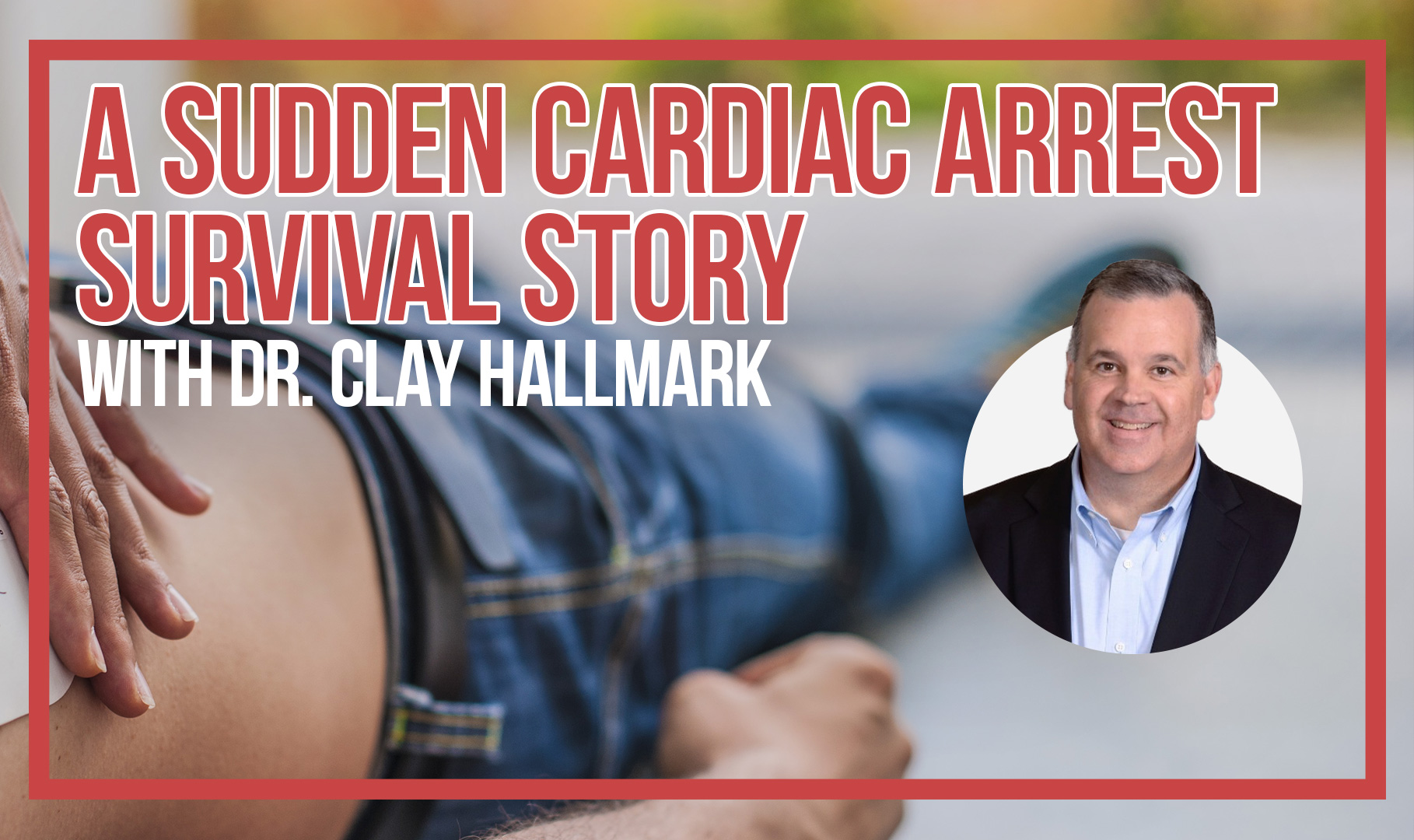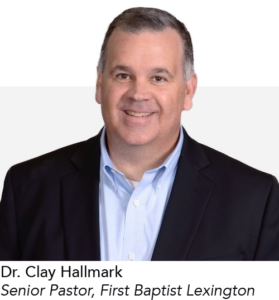Blog
Dr. Clay Hallmark- An SCA Survival Story

 Dr. Clay Hallmark is the Senior Pastor at First Baptist Lexington, TN, and last year was the first unanimously re-elected President of the Tennessee Baptist Convention since the 1940s. Dr. Hallmark moved his family to Lexington in 2016 and has faithfully served his church and local community for the last seven years. The community became their true home, and Dr. Hallmark firmly believes he will retire in Lexington, TN.
Dr. Clay Hallmark is the Senior Pastor at First Baptist Lexington, TN, and last year was the first unanimously re-elected President of the Tennessee Baptist Convention since the 1940s. Dr. Hallmark moved his family to Lexington in 2016 and has faithfully served his church and local community for the last seven years. The community became their true home, and Dr. Hallmark firmly believes he will retire in Lexington, TN.
But something changed his life forever on March 6th, 2021, when tragedy struck.
“That day, my youngest daughter was in town for her bridal shower, and we had a women’s ministry event at First Baptist. After serving lunch with the Men’s Sunday school group, I went home for about ten minutes, then decided to head back to help them clean up, put presents in my truck, and get set up for Sunday.
After moving chairs and loading presents, my daughter asked me to put my first granddaughter (about eight months old) in her SUV. I remember carrying her to the car, setting her into her car seat, and playing peekaboo. I tell her, ‘grandpa loves you.’ I shut the door, looked at my daughter, and said, ‘I feel dizzy.’
And at that point, my heart stopped.
I fell into the church parking lot with no heartbeat and a major cardiac arrest. It had no warning symptoms, no warning signs. ”
At first his daughter thought it was low blood sugar, but when Dr. Hallmark fell out, she called for help. Three women immediately rushed over; Clay’s sister-in-law, his younger daughter, and his adopted daughter, respectively, are a nurse at Jackson General Hospital, an ER trauma nurse in Birmingham, and a Cardiac nurse at Jackson General.
 “They knew my heart had stopped, and immediately they began CPR, rotating between the three of them,” Dr. Hallmark said.
“They knew my heart had stopped, and immediately they began CPR, rotating between the three of them,” Dr. Hallmark said.
From the time Clay fell into cardiac arrest, his daughters delivered over 10 minutes of CPR. Since their new church buildings’ AEDs had not arrived yet, a deacon ran across the street to the fire department, who brought over their AED. And there, they delivered a life-saving shock. They found out after the fact from the AED data that Clay was within 3 seconds of receiving a second shock when his heart began beating again.
“They were tending to me in the parking lot. I don’t remember that at all. I know one of my deacons arrived and got in the ambulance with me. The only thing I remember was he had his hand on my head.
I was taken to the emergency room at Jackson General Hospital, where Doctor Kelly Green was the cardiologist on call, which was a godsend. They immediately went to work on me, ensuring I was stable and knew what had happened. I was in ICU for several days. What I wound up having was an arrhythmia problem. I got out of it with cardiac rehab, but I had to wear a life vest for six months.
But both cardiologists told me separately that I had about a 5% chance of being alive. Had it not been for my daughters’ immediate action of CPR and a life-saving AED shock, I would not have lived. If I had been anywhere else, I wouldn’t be here having this conversation with you. I’m thankful to the Lord, and his plan for my life. I’m thankful to the skilled doctors and my daughters. I’ve shared this with many people and told them you’ve got to be physically and spiritually ready for emergencies like these. When they arrived, AEDs were placed everywhere throughout the church, and our congregation immediately trained on CPR and AEDs. It’s essential that when we go anywhere, games, youth camps, or senior events, an AED goes with us.
 I’m thankful that February brings awareness to issues such as sudden cardiac arrest and CPR. These are things I was aware of in the past but am now obviously very sensitive to in the present. And, of course, I’m an enormous promoter of knowing CPR and how to use AEDs. It’s something we need not just in Jackson; we need it everywhere. If ever there was something that the state or county and city governments ought to get behind, it should be life-saving access to AEDs.”
I’m thankful that February brings awareness to issues such as sudden cardiac arrest and CPR. These are things I was aware of in the past but am now obviously very sensitive to in the present. And, of course, I’m an enormous promoter of knowing CPR and how to use AEDs. It’s something we need not just in Jackson; we need it everywhere. If ever there was something that the state or county and city governments ought to get behind, it should be life-saving access to AEDs.”
Sudden cardiac arrest (SCA) is a leading cause of death among adults over 40 in the United States and other countries. In the United States alone, approximately 250,000 people die every year from SCA, according to the Centers for Disease Control. Thanks to the preparedness of those around him, professional responders, and the availability of an AED, Dr. Hallmark made a full recovery. We know the more people get trained in CPR and have access to an AED in their office, school, and public/private facilities, the more lives we can save.
To learn more about how you can stay equipped in case of an SCA or other traumatic emergency, view our AED Solutions or emergency preparedness kits. To inquire about CPR training solutions for yourself or your staff, reach out to our clinical sales specialist Trent Harris at tharris@mmemed.com.
